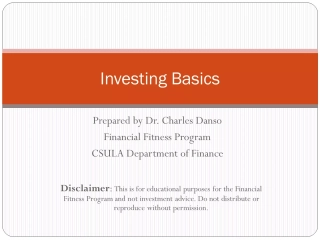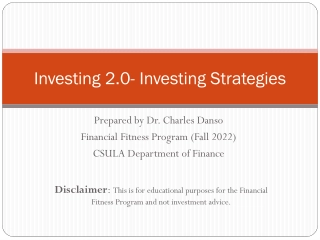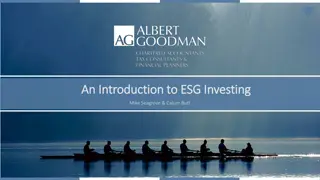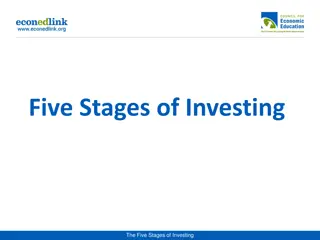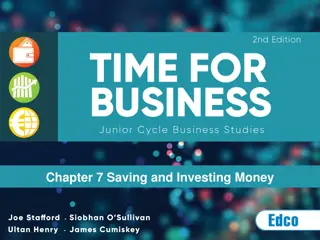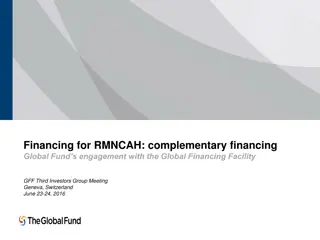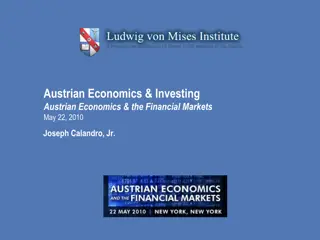Principles of Successful Investing: Key Decisions and Strategies
Explore the key decisions and timely strategies for successful investing, focusing on asset allocation, selecting ingredients, and maximizing returns. Understand how to pick your investment ingredients, decide on asset allocation, and utilize rebalancing and tax loss harvesting. Plan your investment recipe wisely for a prosperous financial future.
Download Presentation

Please find below an Image/Link to download the presentation.
The content on the website is provided AS IS for your information and personal use only. It may not be sold, licensed, or shared on other websites without obtaining consent from the author.If you encounter any issues during the download, it is possible that the publisher has removed the file from their server.
You are allowed to download the files provided on this website for personal or commercial use, subject to the condition that they are used lawfully. All files are the property of their respective owners.
The content on the website is provided AS IS for your information and personal use only. It may not be sold, licensed, or shared on other websites without obtaining consent from the author.
E N D
Presentation Transcript
Principles of Successful Investing Quick Update Quick Update Your Most Important Investment Decision Your Most Important Investment Decision How to pick your ingredients? How to pick your ingredients? 2 Timely Investment 2 Timely Investment S Strategies use Today. use Today. 1. 1. 2. 2. 3. 3. trategies Y You can ou can 4. 4.
Your most Important Decision is your Asset Allocation What kind of pie do you want to make?
What Kind of Pie is best for You? Data source: Morningstar Inc., 2019 (1926 2018). Past performance is no guarantee of future results. Returns include the reinvestment of dividends and other earnings. This chart is for illustrative purposes only and does not represent actual or implied performance of any investment option. See footnote 2 below for detailed information. The purpose of the target asset mixes is to show how target asset mixes may be created with different risk and return characteristics to help meet a participant's goals. You should choose your own investments based on your particular objectives and situation. Remember, you may change how your account is invested. Be sure to review your decisions periodically to make sure they are still consistent with your goals.
Rebalancing Note: The goal of rebalancing is to minimize risk, rather than maximize return.
Compliance Disclosures Financial Planning and Investment Advisory Services offered through Heartwood Financial Services LLC, a Registered Investment Advisor The material has been prepared for informational purposes only and is not intended to provide, nor should it be relied upon for, accounting, legal or tax advice. References to future returns are not promises or estimates of actual returns a client portfolio may achieve. Any forecasts contained herein are for illustrative purposes only and are not to be relied upon as advice or interpreted as a recommendation. Opinions and estimates offered constitute our judgment and are subject to change without notice, as are statements of financial market trends, which are based on current market conditions. Information and data referred to in this document has been compiled from various sources and has not been independently verified. We believe the information presented here to be reliable but do not warrant its accuracy or completeness. This material is not intended as an offer or solicitation for the purchase of any financial instrument. The views and strategies described may not be suitable for all investors. All returns represent total returns for the stated period. The Bloomberg Barclays Aggregate Bond index is a broad-based flagship benchmark that measures the investment grade, US dollar-denominated, fixed-rate taxable bond market. The S&P 500 Index is a market capitalization weighted and unmanaged group of securities considered to be representative of the stock market in general. The Russell 3000 index is a market capitalization weighted index that measures the performance of the largest 3,000 companies representing approximately 98% of the investable U.S. equity market. The Russell 2000 Index is a market capitalization weighted index that measures the performance of the smallest 2,000 companies in the Russell 3000 Index. The MSCI ACWI ex-US index is a market capitalization weighted index designed to provide a broad measure of equity market performance throughout the world and is comprised of stocks from both developed and emerging markets outside of the US. The Bloomberg commodity index is designed to be a highly liquid and diversified benchmark for commodity investments. Past performance is not indicative of future results. Diversification does not guarantee investment returns and does not eliminate the risk of loss. You cannot invest directly in an index.


